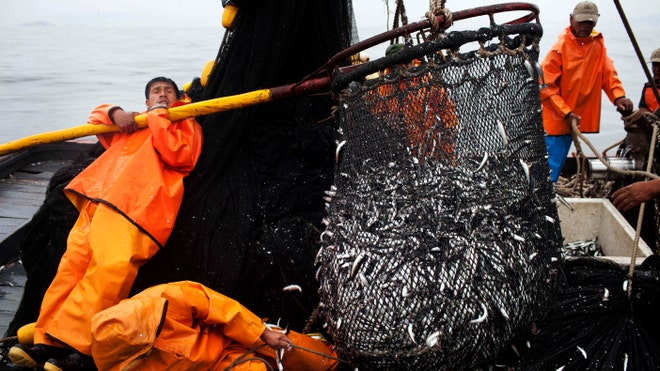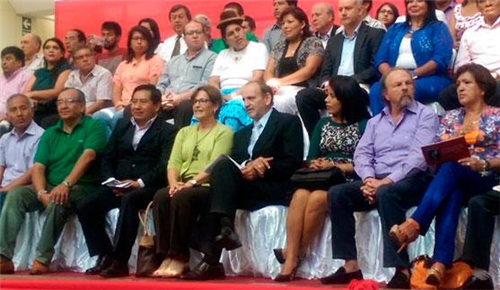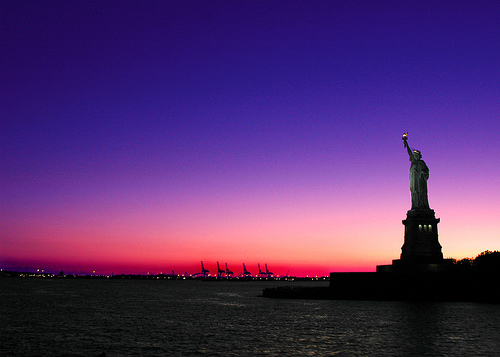|
|
|
|
Peru's economy will expand by around 4% in 2015, the director of Sovereign Ratings at Fitch Ratings Erich Arispe estimated. The expansion will be higher than the one reached in 2014. |
|
The public debt was reduced from a rate close to 90% of the GDP in 1990 to 20% in 2014, the director of the Central Reserve Bank (BCR) Waldo Mendoza announced.
|
|
Peru's Finance Minister Alonso Segura affirmed Peru will continue expanding and by 2015 the primary sectors are expected to experience a "strong economic rebound".
|
|
The President of the Association of Shopping and Entertainment Centers of Peru (ACCEP) Jose Antonio Contreras estimated the growth of the retail sector will be "sustained" throughout the next years in Peru.
|

Some 200 businessmen from the Pacific Alliace will head to Santiago, Chile, to take part of the first meeting of small and medium enterprises (SMEs) from Peru, Mexico, Colombia and Chile.
|

In this week's magazine, William Finnegan writes about gold mining in the ramshackle town of La Rinconada, in the Peruvian Andes. In stark contrast to large-scale, mechanized modern mining operations, the gold mines of La Rinconada are, Finnegan writes, "small, numerous, unregulated, and, as a rule, grossly unsafe." The Peruvian government is attempting to crack down on unregulated mining and "formalize" the industry. But for now, when the price of gold is high, individuals flock to the town to try their luck digging gold from the mountain's quartz veins, and stave off disaster by offering gifts to the mountain deities.
|
There is confidence about reaching the fishing quota (2.58 million tones) set by the Ministry of Production (Produce) for the center-north zone throughout the first fishing season, which kicked off on April 09, 2015, the President of the National Fisheries Society (SNP) Elena Conterno said. |
 The Ministry of Produce (Produce) announced last week that for the region's first anchovy (Engraulis ringens) and longnose anchovy (Anchovy nasus) fishing season the catch would not exceed 2.58 million metric tons. The Ministry of Produce (Produce) announced last week that for the region's first anchovy (Engraulis ringens) and longnose anchovy (Anchovy nasus) fishing season the catch would not exceed 2.58 million metric tons.
|
 Peru's political left is trying to regroup after its falling out with President Ollanta Humala and prepare for next year's presidential election. Well-known leftist politicians and activists have announced the creation of a new leftist political group, aimed at defeating the established right-wing candidates expected to run for office next year, and who are favorite to win.
|
 The President of the Council of Ministers, Pedro Cateriano, will hold today a meeting with Union Regional Party parliamentary group on the sidelines of a dialogue with political and social forces in the country. The President of the Council of Ministers, Pedro Cateriano, will hold today a meeting with Union Regional Party parliamentary group on the sidelines of a dialogue with political and social forces in the country.
|
The representative of the Inter-American Development Bank (IADB) appointed to Lima, Fidel Jaramillo, said the social programs implemented by the government have enabled to reduce extreme poverty in the country, but also have led to generate "human capital." |
 The representative of the United Nations Population Fund (UNFPA) appointed to Lima, Maria Elena Zúñiga, highlighted the fact that the current administration, led by President Ollanta Humala, relies on a population information system, used for designing public policies, which has brought outstanding results in social policy. The representative of the United Nations Population Fund (UNFPA) appointed to Lima, Maria Elena Zúñiga, highlighted the fact that the current administration, led by President Ollanta Humala, relies on a population information system, used for designing public policies, which has brought outstanding results in social policy.
|
The Ministry of Exterior Commerce and Tourism (MINCETUR) began a campaign to boost tourism two years ago to in Peru's cacao producing regions. They predicted that by 2016, nearly 1.2 million people will visit regions such as Piura, Tarapoto, and San Martin. What Mincetur might not have imagined was that for two consecutive years, an American chocolate company who sources prime Peruvian chocolate from Piura would be chosen as the Best New Product and People's Choice in Food Category. This year, Theo Chocolate won the awards for a second year in a row, according to El Comercio. |
 Europeans ate a few more chocolate covered waffles or drank a cup or two more of hot chocolate last year than they did in 2013, according to Peruvian cocoa export figures.
|
North of Cusco - the former capital of Inca empire-, along the Urubamba River, a number of picturesque villages come together, is called the Sacred Valley. A brief guide to spots you don't want to miss on your next trip to Cusco.
|

Peruvians traveling to the exterior from Jorge Chavez International Airport went to the United Statesmore than any other country.
|
- By Nicholas Asheshov - The Incas, living as they did at 3,000 m a.s.l., focused on the Sun's capacity to provide more than warmth for their fertile, glacier-fed tropical valleys. They and their predecessors grasped, like the Egyptians and others, that the movements of the sun, moon, and stars could predict rain and temperatures. |
 The northern Peru site of Chan Chan is currently under major restoration and conservation efforts to maintain it's UNESCO status. The northern Peru site of Chan Chan is currently under major restoration and conservation efforts to maintain it's UNESCO status.
|
The prominent Peruvian athletes Ines Melchor and Raul Pacheco qualified for the Rio 2016 Olympic Games, where both will look for gold. |
The audience filled the Vienna State Opera and applauded tenor Juan Diego Florez enthusiastically and often during a benefit concert he gave on behalf of "Sinfonia por el Peru," the foundation he created in 2011 to help poor children in his homeland.
|
|
|
|
|
Although Ten Top News Peru may include links providing direct access to other Internet resources, including Web sites, the Embassy of Peru is not responsible for the accuracy or content of information contained in these sites. Links from Ten Top News Peru to third-party sites do not constitute an endorsement by the Embassy of Peru of the parties or their products and services. The Embassy of Peru does not endorse either the content or information contained in the selected stories. Furthermore, the stories have been selected based on their circulation in the Web, as trending tropics.
Copyright © Ministry of Foreign Affairs of Peru. All Rights Reserved.
|
|
|